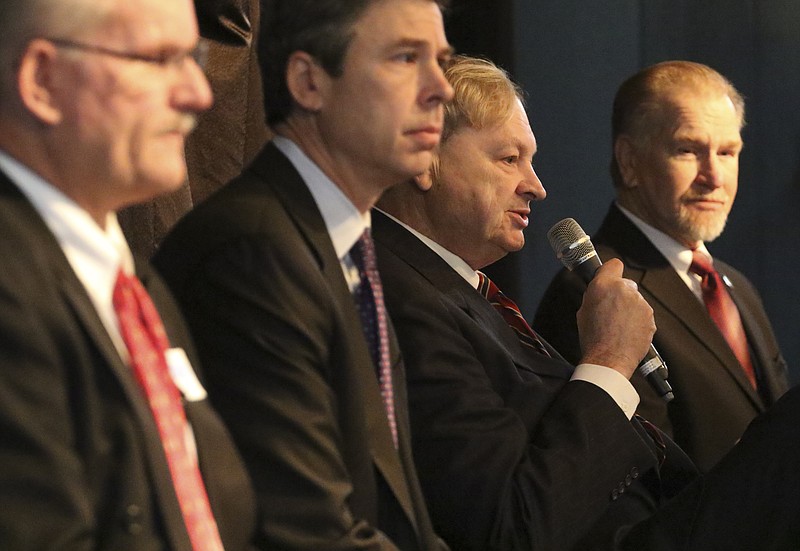Chattanooga voters might know about mayoral candidate David Crockett's stance on high-speed rail and economic development, but they don't know anything about his campaign finances - yet.
Crockett, a former three-time city councilman, is the only candidate in a four-way mayoral race who missed the Jan. 31 deadline to file required financial disclosures with the Hamilton County Election Commission.
Over the last four weeks, he has consistently said his campaign would file the report "soon."
On Friday, he defined "soon."
"I plan to vote with my family and turn in the report Monday at the election office," Crockett said in an email.

Crockett would not reveal the number of his donors, their names or how much money they contributed before he files the report, but he did offer some hints.
"My report will include former elected officials, activists and leaders from all parties and subjects, and former writers and editorial writers of both sides of the Times Free Press," Crockett said.
Though the report is weeks late, Drew Rawlins, executive director of the Tennessee Bureau of Campaign Ethics and Finance, said Friday his office had not received any complaints about Crockett missing the deadline.
The Tennessee Registry of Election Finance can impose civil penalties against candidates who file late or ignore warnings about a required report, Hamilton County Election Administrator Kerry Steelman said in a recent email.
***
Unless Crockett has amassed more than $400,000, he won't be able to surpass the dollars in Mayor Andy's Berke's re-election war chest.
Neither will the other two mayoral hopefuls. Challengers Larry Grohn and Chris Long raised $23,947 and $4,720, respectively, between July and mid-January. Both men have said they don't care how much the Berke campaign has raised.
"As our internal polling shows, Andy Berke cannot buy his way out of the failure of his administration," Grohn campaign spokesman Dalton Temple said recently.
Long benefits from grassroots support and is neither "shocked nor embarrassed" by the money he has received, campaign manager Jack Floyd has said.
While the Berke campaign has plenty of local donors writing $1,500 checks and brought in more than $14,000 in union money from outside Chattanooga, Berke campaign manager Tyler Yount also has touted wide support in smaller donations and volunteers.
"Almost all of our contributions raised to date come from people in Chattanooga, including over 170 donations of $100 or less," he wrote in an email. "When matched with over 100 campaign volunteers who are making thousands of calls and knocking on hundreds of doors, you can clearly see who Chattanoogans want to be their Mayor for the next four years."
Of $248,250 the Berke campaign raised during the reporting period, $549 came from donors who contributed less than $100 each.
***

Amanda Wintersieck, assistant professor of political science at the University of Tennessee at Chattanooga, said winning is not always so much about how much money a campaign brings in, but how they got it and how they spend it, she said.
"People who donate are more likely to vote," Wintersieck said: Donors have invested time and effort to get to know about the candidate.
To that end, a campaign receiving $10,000 from 1,000 donors may be better off than a campaign that raised $20,000 from 200 donors, she said.
Wintersieck recommends scientific, data-driven campaign advertising strategies over "conventional wisdom" that spends money on yard signs.
Yard signage costs about $31 per additional vote, while direct mailers cost $90 per additional vote, she said. While door-to-door campaigning can be the mostly costly, it also is the most effective, she said.
Then there's the nature of the local elections, Wintersieck said.
"In local elections, you have poor turnout except for voters who are highly committed and have already made up their minds and usually vote on partisan lines," Wintersieck said.
Contact staff writer Paul Leach at 423-757-6481 or pleach@timesfreepress.com. Follow him on Twitter @pleach_tfp.
